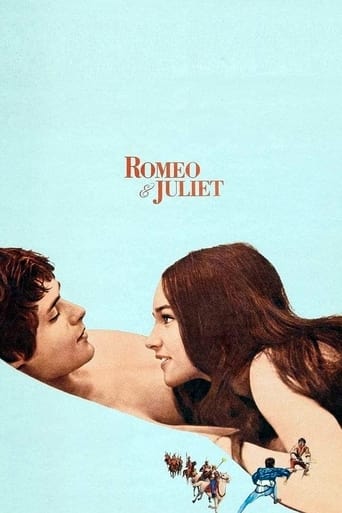sharky_55
It begins and ends with Leonard Whiting and Olivia Hussey, who are the star-crossed lovers through and through. Juliet is thirteen in the play and Romeo barely older, and the fresh-faced pair descend to that level in their words and actions. Most stage productions use adults, with good reason; they understand the stress and the meaning behind each line, the sly wordplay and the literary allusions, while teenagers are still groaning in English class. Yet Franco Zeffirelli knew that a film's fidelity to the original did not have to be complete. He cuts some brilliant lines (generations of young Romeos have compared Juliet's eyes to the stars in the sky) and some superfluous ones, but what remains is the pair's boundless and foolish passion for one another. Watch them come together again in the church to be married, some mere hours after their last meeting, yet they fling themselves at each other and kiss like two ravenous birds, and have to be pried apart by Friar Lawrence. Observe the breathless delivery of their dialogue, always rushing to get to the next line, the next kissing segment. They have no eyes for rhyme or verse, only for each other. The more traditional of the students of Shakespeare may find this blasphemous, but then there are countless dramatic interpretations of the full text for them to savour. What Zeffirelli's film finds is what can't be captured in shabby costume and flat backdrops, of a living, breathing Verona awash in sweat and dust and colour. The cinematography of Pasqualino De Santis captures a city drenched in heat and the fiery passions of two feuding families, with foreheads shimmering in the sunlight with sweat and sharp shadows so alive they almost seem to kick at the dust themselves. Danilo Donati's costumes likewise punctuate the frame with a vividness that matches the brash personalities - Tybalt is all crimson and bright orange to go with his bronzed skin and piercing blue eyes (a missed opportunity here for Mercutio, however). And Nino Rota's famous theme flares up with the same intensity as that of the young lovers, climaxing in a scene at the party so lush and terribly romantic it almost renders the first exchange of rhyming quatrains unnecessary. Romeo is the link between violence and sensuality, between the dusty, earthy day and the serenity of night, although the latter lacks the visual imagination of the former. Shakespeare's antithesis of light and dark makes up many of the crucial images of the play: the flash and sparkle of a lover's eye, the sun and moon as beauty and terror, the seductive and morbid blackness of the wedding bed and then the tomb. Zeffirelli may have taken care to shoot on location as much as possible, and yet the balcony scene reeks of studio lighting, and a dull darkness. In one moment Juliet tightly grasps Romeo's hand and swears her love, and De Santis frames a tiny sliver of moonlight so that it hits only her gleaming eye, full of wonder and hope and adoration. This is offset by the constant top light which illuminates the entire frame in a way that removes much of the allure of the situation. Zeffirelli compensates in other ways; Romeo may be waxing lyrical about Juliet's eyes, which shine brighter than all the stars in all the heavens, but what is also in centre frame? Her porcelain skin, and the hint of cleavage accentuated by the plunging neckline of her bodice. The physicality of the attraction is underlined, and the burgeoning youth of the performers is once again made crucial. This physicality is mirrored in the masculine feuds out on the sun-baked streets of Verona, where the Montagues and Capulets swipe at each other until a blow turns deadly. It is here that Zeffirelli perfects the comedic swagger and flamboyance of Tybalt, Mercutio and their hordes, and how to channel that playful energy into wrath. The camera is perched right in the very midst of their quarrels, spinning dizzyingly as if on a carousel, and then suddenly a blade is bloodied, and a frantic, Peckinpah-esque zoom draws attention to the story's breaking point. Beforehand there is the same dizzying zeal in the boys' bawdy exchanges with the nurse, who scolds Romeo's company but can't help but grin at his wordplay all the same (she's of a lower class, speaking mainly in prose). She's portrayed by Pat Heywood with springs in her feet, bouncing and beaming from scene to scene, providing the comedic flourishes that Shakespeare wields to further drive the inevitable tragedy. The nurse exemplifies the swelling exuberance of the entire film, as do Mercutio and Tybalt, and Romeo and Juliet, who must bear the mantle of the greatest love story of all time. We are all familiar with their demise, although we often forget that they were merely teenagers. But Zeffirelli remembers.
pyattimac
I was 14 years old when this film came out, and sat in the theater all day (ah, remember back when you could do that and not have to pay to see the film again?) with a friend from school, and we just cried and cried. That night I dreamed the whole film again! It was one of the first movies I purchased on video, and I have seen it way too many times to count. It truly remains timeless-- the cinematography is beautiful, the cast delivers across the board, and it never looks dated, even now. The brilliant move of using actors who were actually close in age to the characters they played makes this film work like no other adaptation. One of the best films ever...
stjohn1253
In homage to youthful impetuousness, this author will be brief.Ziffirelli brings to life a classical painting of young love and aggression with his interpretation of ROMEO AND JULIET. To see this film is to enter an art museum that magically animates into 16th century Verona.Few parts of this film flag. For example, consider the authenticity of the fight scenes. Typically, camera cuts fail to hide the "acting" of the combatants, but here you aren't distracted by thoughts of "Well, it IS only a movie." The editor knows when to have you look away; you can enjoy the action with no suspension of disbelief.Casting is virtually flawless. All characters fit their roles, especially the titular leads, Whiting (Romeo) and Hussey (Juliet). So also McEnery (Mercutio); York (Tybalt); and O'Shea (Friar Laurence). The rest are merely fantastic.This review isn't all praise, however, as the nude scene could easily have been cut. Some things are best left to the imagination.In conclusion, today's films don't rise to this level. Ziffirelli took a century's old story, set it in period, and absolutely absorbed the audience's attention with the touch of an artist. How the bar lowered to the CGI baseness now accepted as the norm in the film industry boggles the mind.Can it be that things really were better in the "good old days"?
oOoBarracuda
I was finally able to finish House of Cards so I could get started on my movie list for March; better late than never, right? I chose to watch first perhaps the best known and most imitated work of Shakespeare, Romeo and Juliet. I chose the 1968 adaptation directed by Franco Zeffirelli, starring Leonard Whiting and Olivia Hussey in the titular roles. I selected this adaptation because everything I had read indicated that it was the most faithful adaptation. I wanted to start out my month of Shakespeare strong, and this version of Romeo and Juliet did not disappoint. I'm almost certain that everyone knows the story. The classic tale of forbidden romance ending in tragedy. Teenagers from two competing families unexpectedly fall in love. Romeo Montague (Leonard Whiting) spots Juliet Capulet (Olivia Hussey) while attempting to create a ruckus at a Capulet gathering. Unable to get the young girl out of his mind, Romeo seeks her out under the cover of darkness. Unbeknownst to him, Juliet saw him at the party too and has also fallen instantly in love. At her balcony, Romeo professes his love to Juliet and vows that she will remain the only woman in his heart. Juliet obliges and agrees she will not seek the company of any other men. The problem for their budding romance is their families' years- long feuding. The Capulets and Montagues are hopelessly divided and any romance intermixing the two families would be received as betrayal. In secret, their relationship presses on, culminating in a secret marriage. Juliet is then promised in marriage to a man of her father's choosing. Devastated by the thought of marrying another, and unsure what to do about her predicament, Juliet drinks a potion which will render her with the appearance of being dead. Her co- conspirator, Friar Lawrence (Milo O'Shea) is to get a message to Romeo about the plan. The goal was for Juliet to appear dead long enough to be entombed, then, regain consciousness and run away with Romeo. Romeo never receives the message, and believing Juliet to be dead, poisons himself. When Juliet awakes, sees Romeo has died, kills herself, unwilling to live a life without his love. Obviously, a heavy story involving two teens engaging in a forbidden love, this version of Romeo and Juliet was incredibly faithful to the Shakespeare play. This faithful adaptation bogged down the story with heavy period dialogue. There was also a problem with sound throughout this film. In several scenes, especially high-intensity ones, the speech being heard didn't match the actor saying the words, which was a bit distracting. The sound in the opening battle scene was so off, it was almost comical. The camera work throughout the film made it very dated. Many techniques reeked 1960's and made the film a bit less visually appealing. There were high points to the film. I quite enjoyed the theatrical feel of the film. I enjoy watching plays, and like a movie that can recreate that feeling. The acting was also very well done. Romeo and Juliet showed a wonderfully reserved chemistry on-screen. The actors had to appear hopelessly in love, yet must hide their love from others, no small task, especially for younger actors. Although I don't know how many more times I will see this film, it did prove an exceptionally faithful adaptation of the bard's magnum opus.






